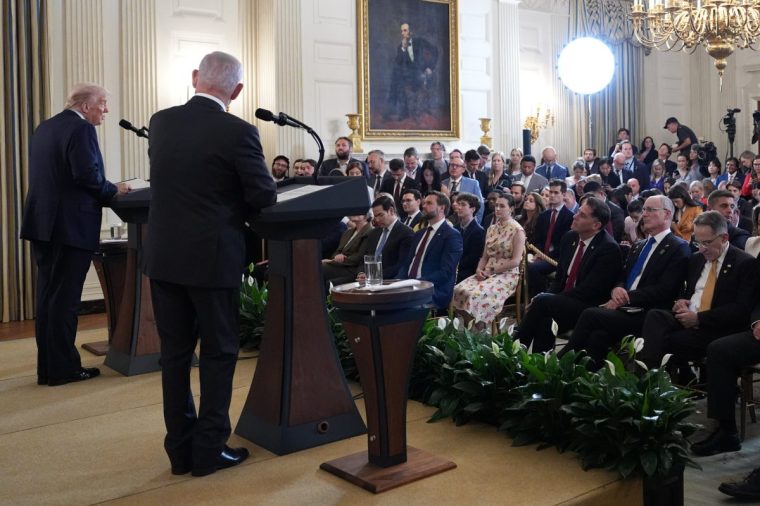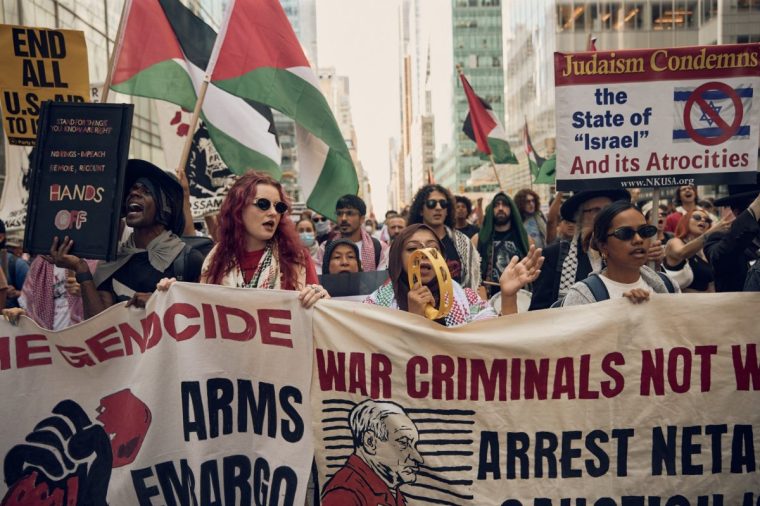Matters are shifting for Donald Trump in the United States – and Americans’ support for Israel’s war in Gaza has now fallen to a record low
WASHINGTON, DC – The rumours had seemed somewhat wild; the idea of a Gazan administration led by Tony Blair, of all people. In the end, it went even further. A “Board of Peace” would indeed hold a committee place open for the former British prime minister – but under the chairmanship of one Donald J Trump.
I was at the White House when the US President’s “comprehensive plan” was unveiled, listening as he insisted he had been persuaded to accept the chairmanship. After all, said Trump (reaching for his regular and somewhat disputed claim) – he had already single-handedly ended seven wars.
The announcement was made to a room packed full of American and foreign journalists who were expecting to ask questions, and hollered them out as Trump and Benjamin Netanyahu finished speaking. Their refusal to take any as they hurried out was perhaps the first sign that this could be significantly more difficult than they had suggested.
Can a President hell-bent on securing a Nobel Peace Prize really bring an end to this intractable conflict, as Israel’s deadly invasion of Gaza in response to the 7 October terror attack grinds towards a third year?
And what will Palestinians make of a Trump-Blair leadership?
On the latter point, Gallup has tried to find the answer, conducting polling within the West Bank and East Jerusalem, but not including Gaza this year because of the security situation. Data released this week shows Palestinians’ huge scepticism with the United Nations (63 per cent disapproving of its performance) and even worse for the US. This latest survey had 82 per cent of Palestinians disapproving of Trump’s leadership, with only 7 per cent approving. Will the presence of Tony Blair alongside the President allay concerns? Unlikely.
Although there isn’t recent research on attitudes towards him, the Gallup poll back in 2007, during Blair’s final year as prime minister (and after so much controversial fallout from his part in the Iraq war), 81 per cent of Palestinians disapproved of the performance of the leadership in the UK.

And how a Trump-Blair led body might be viewed in Gaza itself is not the only challenge to Trump’s plan of peace. Before it was published I spoke to Aaron David Miller – a Middle East analyst at the Carnegie Endowment – who has worked as a state department negotiator through Republican and Democratic administrations. Was he optimistic, I asked?
“I don’t deal with optimism or pessimism,” he said of this bitter conflict, in which both sides have long been irreconcilable, with few breakthroughs, in part because the US, Europe and Arab countries had all failed to impose a single cost or consequence on either.
“We may be closer than ever, but my experience in Israeli-Palestinian negotiations under relatively normal circumstances, not between Israel and Hamas, tells me that they will fight over every single comma, and getting from one phase to the other is going to be excruciatingly difficult and painful,” he said.
And already the potential problems are stark.
Netanyahu stood up in the White House and agreed to a plan which stated – in point 19 – that it would pave the way for “a credible pathway to Palestinian self-determination and statehood”. That felt unexpectedly positive but I was immediately sceptical.

I had returned to Washington DC after a week at the UN headquarters in New York, where I heard the Israeli prime minister tell the General Assembly that giving Palestinians a state a mile from Jerusalem would be like giving Al Qaeda a state a mile from New York. It was never going to happen, he said. So little surprise that after refusing to take questions from journalists inside the White House, Netanyahu made a video insisting that this deal would in no way facilitate a Palestinian state, despite that clear suggestion.
Meanwhile, Arab countries were said by the White House to be on board, but reporting by Axios on what took place behind the scenes painted a different picture. It revealed how Netanyahu had won edits to the text during a six-hour session with Middle East envoy, Steve Witkoff, and Trump’s son-in-law, Jared Kushner. Officials from Saudi Arabia, Turkey and Jordan were said to be furious about the changes that Axios claimed had been added after they had already briefed Hamas.
If the deal fails, Trump has made clear that he will blame Hamas, and give Netanyahu his full backing to “finish the job”. But it is worth pointing out that things have shifted domestically for the President. While it is true that Americans are much more likely to believe Trump’s claims about his progress towards world peace, and are much more positive than Palestinians about Blair (almost two thirds approved of his leadership in the tail-end of his time as prime minister), they are hardening somewhat on Israel.
As well as surveying Palestinians, Gallup has repeatedly asked Americans about the situation in the Middle East. In the month after 7 October 2023 – 50 per cent of Americans supported Israel’s invasion, above the 45 per cent who disapproved. By this summer that situation had reversed, with approval falling to a record low of 32 per cent – while disapproval rose to 60 per cent – the highest yet.
Sympathy in the US still lies more with Israelis than Palestinians but the shift has been sharp. In New York I met a group of liberal Jews celebrating Rosh Hashanah who were speaking out against Israel’s invasion, arguing that while their views had alienated some in their community, tens of thousands of Jewish people felt the same way. And it is also true that even some of Trump’s base have questioned if the time has come for the President to take a stronger position on Israel, questioning the impact of this on his America-first promises.
Miller argued that it was already looking complicated. He said that in his experience the most positive moment for Israel and Palestine had been in 2000. But even back then there had been a “Grand Canyon”-sized gap. And that gulf has only widened since then.
Anushka Asthana is the US editor for Channel 4 News
